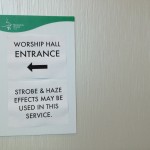This is the first part of Faith and Phoenix: Convening in Arizona after SB1070, a series about how faith based groups with national conventions scheduled in Phoenix responded to Arizona’s image crises during and after the passage of SB 1070; check out Part 2 here.
 Several years ago when the largest Anabaptist organization in the U.S. picked Phoenix for the location of its biannual conference in 2013, they didn’t anticipate that the state would be a hotspot for national debates on immigration and border issues – or that they’d be attempting to produce a denominational statement about immigration there.
Several years ago when the largest Anabaptist organization in the U.S. picked Phoenix for the location of its biannual conference in 2013, they didn’t anticipate that the state would be a hotspot for national debates on immigration and border issues – or that they’d be attempting to produce a denominational statement about immigration there.
Yet, Arizona’s attractions as a tourist and convention destination seemed smashed when the 2010 passage of a controversial immigration bill, SB 1070, sparked intense national debates including issues border violence and racism in the state.
Local community advocate James Garcia, who works with Promise Arizona, said that the news coverage affected everybody’s perceptions, whether they supported the SB 1070 bill or not.
“Suddenly 24-hour news channels for six months straight, all they hear about is the words coming out of the mouth of the governor and Russell Pearce which claimed that the state is being overrun by words of immigrants and everybody is somehow physically endangered,” Garcia said.”So that negative representation was stamped into the brains of America and brains of America include all the people who are part of these conventions.”
Like massive cruise ships, conventions that take years to plan are hard to turn around mid-course.
“The other thing is that the way conventions get booked and the way cities reputations get built, all of those things take a long time,” Garcia said. “And what doesn’t take a long time, I learned a long time ago, is the destruction of a reputation – it does not take a long time; it can happen overnight.”
Arizona’s image crises toxically mixed aspects of the Aruba‘s damaged tourism industry after the disappearance of Natalee Holloway with the moral backlash against racist comments by Chef Paula Deen.
“From a personal standpoint, certainly on the day the SB 1070 passed, I asked myself, ‘am I in the right place and do I want to raise my family here?'” Garcia said.
Garcia’s community work led to discussions with everyone from undocumented immigrants to CEOs.
“I came to the conclusion that SB 1070 was a product of a kind of unique set of confluences of events much the same way that McCarthy took over Congress,” Garcia said. “You know he hijacked Congress and in many ways I was convinced that Russell Pearce and Jan Brewer, that pair of folks, hijacked Arizona politics.”
When SB 1070 passed, individuals and advocacy groups looked for ways to protest. What started out as an organic, spontaneous boycott of the Arizona economy gathered steam when officials like Congressman Raul Grijalva voiced support. The boycott cemented when The National Council of La Raza (NCLR), the nation’s largest Hispanic advocacy group, gave their public support.
“Lot of folks kind of randomly, not necessarily talking to each others, said, ‘we’re going to boycott Arizona, we want them to cancel conventions, you know, we are going to teach Arizona a lesson,'” Garcia said.
The boycott was reexamined as local business organizations became vocal about their disapproval for the bill – yet they were feeling the impact of the boycott as well.
“One of the things that happened relatively quickly and then sort of picks up some steam after the passage of 1070 was that the business community in a kind of public concerted way, basically let be known that SB 1070 was a stupid idea and that they weren’t for it,” Garcia said. “It was designed to obviously sort of punish business if you will, punish the economy and the business leadership for all intents and purposes was saying, ‘we’re not for a boycott of course but we’re also not for 1070, so why are you punishing us?'”
Brendan Walsh, who represents Central Arizonans for Sustainable Economy (CASE), said that he and his organization were ambivalent about whether a boycott was the best way to “bring about justice” in Arizona.
“The question at this point needs to be what resources can we bring into the state to support progressive efforts, not what resources can we block from going into the state,” Walsh wrote in an email exchange. “”Among the people most hurt by a conventions boycott are downtown Phoenix hotel workers, who, with their union UNITE HERE have been among the most active Arizonans when it comes to building voting power, fighting the abuses of Sheriff Arpaio, and raising standards for workers in the state.”
Advocates like Walsh believed that supporting local communities and organizations would lead to more improvements than the boycott.
“We need more investment in our community, not less,” Walsh wrote. “We also need to build up local organizations that have the potential to change the culture of our State.”
Garcia said that the NCLR recognized that business groups opposing SB 1070 were “trying to either de-fang it or ultimately do away with it”. This groups included the HIspanic Chamber of Commerce, who joined 16 other plaintiffs to sue the state. Parts of the lawsuit are still working their way through the court system, some at the 9th Circuit of Appeals.
“Those same forces are saying the solution is not in the state legislature and that they’re saying we oppose it, being dealt with in the state legislature, we believe it should be dealt with in Congress,” Garcia said. “And that position of course correlated directly with what all the progressive groups have been saying, that they think immigration in Arizona is a federal issue, it should be done through federal means.”
So the NCLR backed out of the boycott and it “started to fizzle,” yet the state’s reputation was in tatters.
“The perception by people outside of the state was that somehow the majority of the people in this state must be racist in the way that people were racist in 1952 Alabama,” Garcia said. “That perception was factually incorrect, but the perception that that was true was real, of course, and it was being perpetuated and that takes a really long time to bounce back from and recover from.”
The U.S. Mennonite Church and the Unitarian Universalist Association of Congregations were both especially concerned about the ramifications of meeting in Arizona, though, in the end, both went ahead with their planned events. The ways in which they did differed..
Both have theologically committed to social justice (and in the case of the Mennonites, pacifism). Both are experiencing demographic changes in their congregations to mirror national trends of growing “minority” populations. Both were in the process of planning national conventions that would take place in Phoenix when SB 1070 passed – and both reevaluated sticking with plans to hold their national conventions in Phoenix.
The Unitarian Universalists, with a U.S. membership of around 630,000, is a liberal religious group that is characterized by its openness to all, regardless of creed or belief or even unbelief. They have, in common with Mennonites, an avoidance of church hierarchy, but they allow for even more individual pursuit of truth, in whatever form it arrives. They are typically seen as a fairly liberal group.
Unitarian Universalist President Peter Morales said his church has been supporting and working towards compassionate immigration reform for some time.
“We try to focus on a handful of issues historically very close to the hearts of people where we have some background and some credibility,” Morales said. “We have long been opposed to any discrimination against people.”
Previous to SB 1070, Morales himself was arrested, along with other ministers and church members, while protesting how immigrants were being treated and their families separated.
“I often tell our people that as a nation we can’t paint ourselves as the passive victims of this invasion, in fact our economic and foreign policies have helped create the situation in Southern Mexico and in Central America that displaced so many people and turned them into economic refugees,” Morales said. “And that’s why they come to the United States, so it’s not like we have no responsibility in the situation.”
The UUA, who also does work with environmental justice and marriage equality, has an international office at the United Nations.
“Immigration fits right in, it’s a pattern of racism and marginalization,” Morales said. “So for us it’s really about people who take their value commitment to their faith seriously.”
Unitarians see immigration policy as a human rights issue.
“Very clearly our immigration policy that that leads to people dying in the desert, that deals to horribly extended detentions, that breaks family apart is not consistent of the values,” Morales said. “Not only Unitarian Universalism but really of any faith group that I know.”
 Now the church needed to think about how to balance requests from local advocates to boycott Arizona with invitations from their Phoenix and Tucson congregations to come.
Now the church needed to think about how to balance requests from local advocates to boycott Arizona with invitations from their Phoenix and Tucson congregations to come.
“All of them unanimously asked that we come to Arizona and use it as an opportunity to highlight the issue and do public witness rather than boycott it,” Morales said.
Leave a Reply